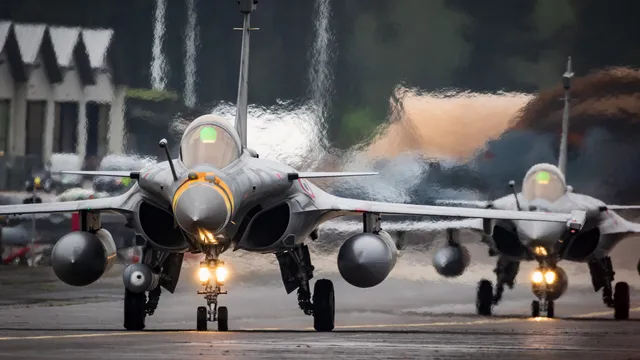
Croatia bolsters defense with Rafale fighter jet acquisition
2025-05-05 20:26- In 2021, Croatia signed a deal to purchase twelve Rafale fighter jets from France for $1.21 billion.
- The acquisition aims to modernize Croatia's military by replacing older Soviet-era aircraft.
- This move demonstrates Croatia's commitment to enhancing national security and increasing defense spending.
Express your sentiment!
Insights
In recent years, Croatia has made significant strides in modernizing its military. As of 2021, the Croatian government finalized a deal to procure twelve French Rafale fighter jets, marking a substantial investment in defense capabilities valued at around $1.21 billion. This acquisition is part of Croatia's broader strategy to enhance its military infrastructure, replacing outdated Soviet-era aircraft, specifically the Mikoyan-Gurevich MiG-21 fighters that have been in service since the early 1990s. The Croatian Defence Minister Ivan Anušić emphasized that the new Rafale squadrons represent not just an upgraded military asset but also a commitment to safeguarding national security with advanced technology. The deal with France included not just the jets themselves but also spare parts, three years of logistical support, and training for Croatian Air Force pilots and personnel. This step aligns with Croatia's goals to increase its defense spending, aiming to reach 3 percent of its GDP in the forthcoming years. Croatia's military upgrades come amidst a shifting geopolitical landscape, with increasing concerns about regional security in Europe and beyond, leading to heightened defense expenditures in multiple countries. Moreover, this military modernization is not isolated to the Rafale purchase. Croatia has also retired its fleet of Mi-8 helicopters, having provided them to Ukraine, while diversifying its air capabilities by acquiring American-made Sikorsky UH-60 Black Hawk helicopters and M2 Bradley infantry fighting vehicles. While Croatia's commitment to enhancing its military hardware is noteworthy, the country is also navigating the challenges posed by its legacy equipment, which has proven to be less effective compared to modern alternatives. As it stands, the Rafale jet has gained popularity not just in Croatia but also in other regions, including the Middle East, where nations like Iraq are considering similar acquisitions to complement their air forces. A proposed oil-for-jets deal could see Iraq receiving these advanced fighters, enhancing its military capacity alongside American-made F-16IQ aircraft. However, the geopolitical dynamics surrounding such transactions, particularly involving military equipment and relationships with countries like Israel, will continue to shape the regional balance of power and security discussions.
Contexts
The acquisition of Rafale jets by Croatia represents a significant enhancement to the capabilities of the Croatian military. The Rafale fighter jets, developed by Dassault Aviation, are recognized for their versatility, advanced technology, and combat readiness. This acquisition not only marks a strategic advancement in Croatia's defense posture but also reinforces its commitments to NATO and EU defense initiatives. The addition of these aircraft is expected to significantly bolster Croatia's air force, providing enhanced operational capabilities in various mission scenarios, including air defense, ground attack, and reconnaissance operations. Furthermore, the investment in Rafale jets aligns with Croatia's strategic goal of modernizing its armed forces to respond effectively to emerging security threats in the region. The multirole capabilities of the Rafale will enable Croatia to engage in a broader spectrum of military operations, contributing to national security while ensuring interoperability with allied forces. The advanced avionics, weapons systems, and networking capabilities of the Rafale jets will facilitate joint operations with NATO forces, thereby enhancing collective defense endeavors. This integration into the Croatian military will also allow for improved coordination during multinational military exercises and operations. Additionally, the economic implications of acquiring such advanced aircraft are considerable. The procurement is likely to stimulate domestic defense industries through potential partnerships and technology transfers. Croatia’s investment in Rafale jets could also lead to job creation in related sectors as the country seeks to develop its indigenous defense capabilities. This procurement decision not only strengthens Croatia’s military but also illustrates its commitment to fostering a robust defense industry that can support both national and regional security. In conclusion, the impact of acquiring Rafale jets on the Croatian military is profound, encompassing operational, strategic, and economic dimensions. The integration of these advanced fighter jets will enhance Croatia’s defense capabilities, ensuring better preparedness against various threats while contributing to regional stability and security. The decision reflects a broader trend seen in many nations where modernization and interoperability with NATO forces are prioritized. As Croatia moves forward with the implementation of this acquisition, observing the operational effectiveness and the long-term benefits of Rafale integration will be critical for assessing its success.